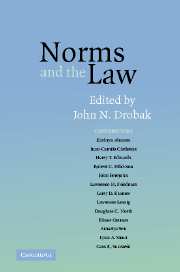Book contents
- Frontmatter
- Contents
- List of Contributors
- Acknowledgments
- Introduction
- PART ONE RATIONALITY AND NORMS
- PART TWO NORMS OF THE COMMONS
- PART THREE JUDICIAL NORMS
- 7 Judging the Judges: Some Remarks on the Way Judges Think and the Way Judges Act
- 8 Judicial Independence in a Democracy: Institutionalizing Judicial Restraint
- 9 Black Judges and Ascriptive Group Identification
- 10 Judicial Norms: A Judge's Perspective
- PART FOUR THE INFLUENCE OF LAW ON NORMS
- References
- Index
7 - Judging the Judges: Some Remarks on the Way Judges Think and the Way Judges Act
Published online by Cambridge University Press: 05 June 2012
- Frontmatter
- Contents
- List of Contributors
- Acknowledgments
- Introduction
- PART ONE RATIONALITY AND NORMS
- PART TWO NORMS OF THE COMMONS
- PART THREE JUDICIAL NORMS
- 7 Judging the Judges: Some Remarks on the Way Judges Think and the Way Judges Act
- 8 Judicial Independence in a Democracy: Institutionalizing Judicial Restraint
- 9 Black Judges and Ascriptive Group Identification
- 10 Judicial Norms: A Judge's Perspective
- PART FOUR THE INFLUENCE OF LAW ON NORMS
- References
- Index
Summary
Judges, as everybody knows, have a very special role in common law legal systems. In common law systems, a good deal of the law is judge-made. An important body of rules, doctrines, and practices developed over time, through case-law, and cannot be tied to any statutory text. Common law decisions created the bulk of the law of contracts and torts, and a good deal of the law of property. The common law mentality extends even to fields of law that do have a text (which, today, most of them do). To a common law lawyer, a statute hardly means anything until it goes through its baptism of fire – getting construed by courts. And some statutes are so vague that they hardly restrict the judges at all; the case-law under such statutes is basically common law. In many areas of law that are, in theory, statutory, significant bodies of doctrine take the form of “interpretations” but are in fact attached to the text (of a statute or regulation) by the thinnest of strings, or no string at all.
In common law countries, legal tradition and education focus heavily on the work of judges. Statutes, laws, regulations, ordinances have multiplied in the last century like rabbits; yet law schools still spend almost all of their time on case-law. The materials that students break their heads over are contained in thick books called “Cases and other materials,” but the cases far outnumber and outweigh the “other materials.”
- Type
- Chapter
- Information
- Norms and the Law , pp. 139 - 160Publisher: Cambridge University PressPrint publication year: 2006
- 8
- Cited by



